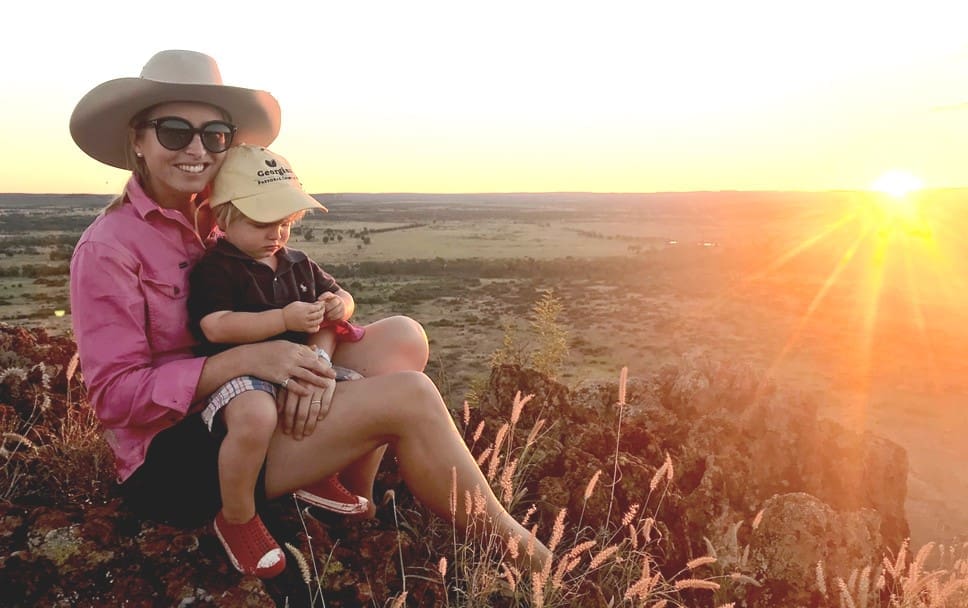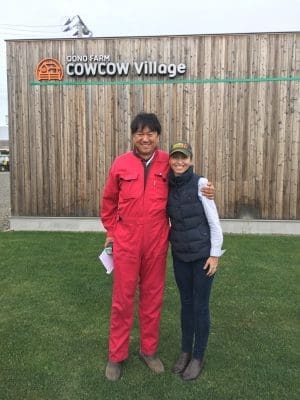
Sarah Hughes from Tumbar Station in central western QLD travelled to North Asia, Europe and North and South America as part of her Nuffield scholarship looking into Wagyu niches
A GLOBAL investigation into the production and marketing of grassfed and organic Wagyu to generate new opportunities for Australia’s beef industry was the focus of a Nuffield research report released today by central Queensland beef producer Sarah Hughes.
The 2016 Nuffield Scholar was supported by ANZ Agribusiness and AA Co, the nation’s largest producer of Wagyu beef. Their joint support enabled Sarah to visit leading beef enterprises across Asia, Europe, New Zealand and North and South America.
Sarah and her husband Fred manage Hughes Grazing’s Tumbar Station, in central western Queensland. The property is certified organic and the company has secured long-term supply agreements with a number of Wagyu feeding operations including AA Co.
During her time managing one of Australia’s largest cattle stations, Lake Nash, Sarah saw an unprecedented opportunity to assess the business case for Australian organic and grassfed Wagyu cattle including production, breed traits, genetics and price premiums.
“Wagyu, as we know it, is characterised by a distinct marbling quality, which is the result of an intensive grain diet combined with a genetic potential to marble. Grassfed Wagyu, on the other hand, has the same distinctive marbling, although to a much lesser extent,” said Sarah.
“Grassfed Wagyu contains up to three times the amount of healthy fats compared with cattle reared on grain. As healthy fats are associated with reduced disease risk (French et al. 2000), this is potentially a game-changer for producers, and could help to address recent health concerns associated with red meat.
Grassfed over Organic?
“Interestingly, on my Nuffield journey, it also became clear that to many consumers, grassfed beef was more appealing than organic beef. This is not just from a scientific health perspective, but also because of the increasing corporatisation of organic farming.”
A great example of grassfed Wagyu that Sarah came across was the Natural Wagyu Company, a traditional dairy farm owned and operated by 1998 Nuffield Scholar, Will Prichard, which is located in Pembrokeshire on the Welsh coast.
“Will was looking for a way to add value to his business, and saw an opportunity with bobby calves. It evolved into a highly successful program, which sees him breed grass-fattened dairy x Wagyu animals to sell into high end retailers like Wholefoods, UK.
“The program captures around A$2860 per steer carcase, which roughly reflects a 50 per cent premium above conventional market prices. The cattle are reared on grassfed pasture for 210 days a year, and in the colder months are fed on the farm’s hay and silage supply.”
While Sarah sees great potential in Australian grassfed Wagyu production, she said there were commercial challenges involved as well.
“Some large scale producers will face issues around consistency and degree of marbling with grass-fed Wagyu, and some cuts generally perform better than others,” Sarah said.
“Currently, the value of the long-fed Wagyu model, which is the most common method in Australia, lies in its ability to achieve consistency and associated strong prices for the whole carcase, which is why they attract such significant premiums.

Sarah Hughes visited Yasuhiro Oono’s Wagyu feedlot and integrated production system while in Japan.
“This long-fed model is exemplified by Australian brothers, John and Keith Hammond, who own and operate Robbins Island Wagyu. The company has been praised for its Wagyu beef from renowned chefs such as Tetsuya Wakuda and Neil Perry.
“However, the brothers discontinued their grassfed offering once it became apparent that the business case didn’t stack up.”
On her study tour, Sarah visited Japan, the home of Wagyu. The experience provided her with a greater understanding of the origin and traditions associated with fullblood Wagyu cattle.
“For a large part of its history, Japan was officially a vegetarian country. Still today, Wagyu beef production in Japan is highly regulated. The genetics are tightly protected and the fullblood cattle are considered a national treasure,” Sarah said.
“Around the world, people are fascinated by Wagyu – many have tried it, many have not. For beef wholesalers, they’re always on the lookout for unique brands that have a great story to tell.
“If the conditions are right, there are certainly niche markets available for Australian Wagyu producers. My key takehome is that consistent quality, reliable supply and the proposition of value is fundamental to achieving success with grassfed or organic Wagyu.
“The Nuffield Scholarship has taken me around the world – it has been a privilege and an experience I will always treasure. I encourage producers to take a look at my final report, which provides a suite of case studies and recommendations, for those considering grassfed or organic Wagyu production.”
- Click here to view Beef Central’s earlier profile on Oono Farm’s unique Wagyu operations in Hokkaido, visited during Sarah Hughes’ recent Nuffield scholarship.
Source: Nuffield

Where can we view your report Sarah?
Also interested in the marbling v growth the NZ guys have achieved? As they’re a bit ahead of here on grass
Thanks for your inquiry Jason – Sarah’s full report can be downloaded by clicking here – Editor
Hi there, very interesting, where can we obtain a copy of the report?
regards,